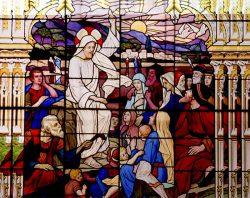Am I a good shepherd of souls? Am I a good sheep of the Lord’s sheepfold? This is the invitation that Scripture urges us to meditate upon.
Newsdesk (02/07/2023 14:45, Gaudium Press) It is enough to leaf through the pages of the Gospels to see how much shepherding symbolizes the relationship between God and mankind. In this way, a reading from the Gospel of Matthew brings to us the image of the shepherd and the sheep in order to corroborate God’s predilection and love for us.
The love of the Lord for his sheep
“When He saw the crowds, He had compassion for them, because they were harassed and helpless, like sheep without a shepherd.” (Mt 9:36)
At that time, society was very connected to the countryside. Thus, in a didactic way, Jesus often referred to pastoral activity in His preaching, even presenting Himself as the Good Shepherd, in order to be well understood by His listeners. In the verse quoted, He mentions the distress of sheep that have no shepherd. In fact, in the absence of a shepherd, the animals tend to disperse and, wandering out of their normal range, often become fatigued. If there were a shepherd, he would direct the flock to the best pastures where it could feed and rest quietly under his watchful protection.
This figure reflects a much more painful reality concerning the salvation of souls. Without a competent spiritual guide who knows how to discern the needs of the group entrusted to him, and adapt the learning and progress to the spiritual circumstances of each one, people become disoriented and, led by evil tendencies, stray from the straight path, taking the path of sin, in search of the illusory happiness provided by earthly goods. This aimlessness leads to weariness and discouragement. Yet so often a glance of encouragement or a word of confidence from a fervent pastor would be enough to lead them back to the practice of virtue.
Indeed, when it comes to the salvation of the soul, the advice of a more experienced person is of great assistance. It is a classic principle of the interior life that the greatest concern of the devil when tempting someone consists precisely in the victim’s seeking the guidance of a superior or confessor. When this happens, the perfidious diabolical manoeuvres are soon unmasked, becoming innocuous, because evil progresses to the extent that it is able to camouflage its ultimate intentions.
Jesus, by His divine knowledge, from all eternity saw the state of impoverishment of the multitudes that would follow Him. As a man, however, He had not yet experienced that terrible situation of spiritual penury. Therefore, when He saw it, He “had compassion for them”, that is, He suffered, He suffered with them. He thus made their suffering His own.
Today, unfortunately, due to a misconception, compassion is understood almost only in the sense of material needs. Certainly these needs must be met by opening people to the action of grace. It was Christian civilization that introduced works of charity into human relationships. From the maternal solicitude of the Church were born hospitals and numerous institutions for the care of the poor and the destitute. But of itself, it is more important – without dispensing with the material – to give doctrinal formation and spiritual consolation, because the soul is by nature more noble, elevated and important than the body. There is nothing that can equal the joy that comes from a balanced and tranquil conscience. When it is not clean and transparent, man does not feel happy, even though he enjoys all the earthly goods.
It is supernatural happiness, sought in vain by the crowds, that Jesus wants to offer them. They were tired and downcast because there was no one to guide them properly to the coming of the Messiah, which the Scriptures indicated was near. To make matters worse, there were the false guides who, “being supposed to be shepherds, behaved like wolves, for they not only failed to correct the multitude, but were the greatest obstacle to their progress.”[1]
And this orphanhood was not restricted to those times. If the Word were to become incarnate in our times, surely His attitude would not be any different, or perhaps His compassion would be even more pronounced, to the extent that the world is ever more bewildered and diverted. For lack of a sufficient number of authentic pastors, public opinion is deafened to the voice of God, it is unable to communicate the truth to others and it ends up not understanding the salvation that is presented to it by the Church. Just as in His earthly life Jesus took the initiative of going into the villages, healing everyone on the way, without rejecting anyone; today too He goes in search of the helpless crowds and is always ready to welcome the sinner. All that is needed is sincere repentance and a desire to amend one’s life. This is the hour to take pity on the flock and to remember the obligation of every baptized person to do apostolate with his or her fellow men.
Let us ask the Divine Shepherd, then, “to send out labourers into His harvest.” (cf. Mt 9: 38) and to instil in His pastors that true love and zeal for the cause of God, so that in this way the prayer of the Church will be fulfilled: may the sheep of His fold will and act according to God’s Will, following His commandments.
By Guilherme Motta
Extracted, with adaptations, from João Scognamiglio CLÁ DIAS. New Insights on the Gospels.
[1] ST. JOHN CHRYSOSTOM. Homily XXXII In: Homilies on the Gospel of St. Matthew
Compiled by Roberta MacEwan


































